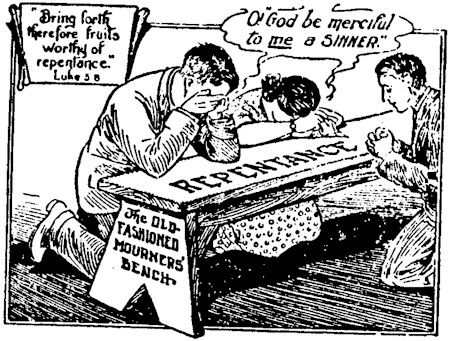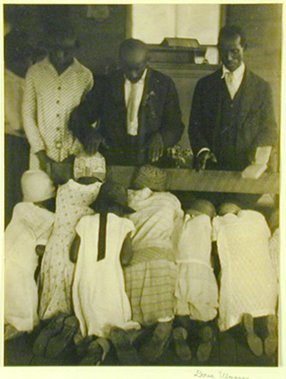- Jul 6, 2004
- 25,285
- 2,868
- 59
- Country
- United States
- Faith
- Eastern Orthodox
- Marital Status
- Married
- Politics
- US-Republican
Sacred tradition - Wikipedia
In Orthodox theology, Holy Tradition is the inspired revelation of God and catholic teaching (Gk. katholikos, "according to the whole") of the Church, not an independent source of dogmatic authority to be regarded as a supplement to biblical revelation. Tradition is rather understood as the fullness of divine truth proclaimed in the scriptures, preserved by the apostolic bishops, and expressed in the life of the Church through such things as the Divine Liturgy and the Holy Mysteries (Eucharist, baptism, marriage, etc.), the Creed and other doctrinal definitions of the Seven Ecumenical Councils, canonical Christian iconography, and the sanctified lives of godly men and women (the Saints). (They left out sacred music.)
According to the theological understanding of these Churches, sacred scripture is the written part of this larger tradition, recording (albeit sometimes through the work of individual authors) the community's experience of God or more specifically of Jesus Christ. Hence the Bible must be interpreted within the context of sacred tradition and within the community of the church. This is in contrast to many Protestant traditions, which teach that the Bible alone is a sufficient basis for all Christian teaching (a position known as sola scriptura).
............
Holy (T)radition for the Eastern Orthodox is the deposit of faith given by Jesus Christ to the apostles and passed on in the Church from one generation to the next without addition, alteration, or subtraction. Vladimir Lossky described tradition as "the life of the Holy Spirit in the Church." It is dynamic in application yet unchanging in dogma. It is growing in expression yet is always the same in essence. The Eastern Orthodox churches do not regard tradition as something which accrues or expands over time. Rather, Orthodox believe (Holy T)radition is the faith which Jesus Christ taught to the apostles and which they gave to their disciples without any development or deepening in understanding of the faith. It is merely that faith once delivered as understood within the context of lived history.
Holy Scripture - OrthodoxWiki
The Holy Scripture is a collection of books written over multiple centuries by those inspired by God to do so. It is the primary witness to the Orthodox Christian faith, within Holy Tradition and often described as its highest point. It was written by the prophets and apostles in human language, inspired by the Holy Spirit, and collected, edited, and canonized by the Church. Above all, the Bible is a faith document.
The Integrity of Scripture
Because the Bible is a faith document, we must respect its integrity as the final revelation of the Orthodox Christian faith. We do not recognize any other writings as canonical Scriptures other than those listed below. Though the Bible does not constitute an all-sufficient summary of revelation, no new revelation has been given. Even if another document were to be unearthed which scholars all agreed came from the hand of Paul or Moses, it would not be added to the canon. Likewise, if an existing part of the canon were undeniably proven not to be from its traditionally ascribed author, it would not be removed from the canon.
Nicene-Constantinopolitan Creed

The Creed in mosaic at Holy Trinity Greek Orthodox Cathedral (New York, New York)
The Nicene-Constantinopolitan Creed (also called the Nicene Creed, the Symbol of Faith, the Pistevo, or simply the Creed) is that creed formulated at the First and Second Ecumenical Councils. It was defined by the Holy Fathers of those first two councils (held in Nicea and Constantinople, respectively) to combat various heresies: notably Arianism, Apollinarianism, Macedonianism (also called Pneumatomachianism), and Chiliasm.
Some scholars believe that the Creed promulgated by the First Ecumenical Council was based on an earlier baptismal creed used in Palestine (the Apostles' Creed), while others regard its more likely origin as being a creed issued early in 325 A.D. in Antioch, a so-called "Syrian Creed."
The Creed as it now stands was formed in two stages, and the one in use today in the Orthodox Church reflects the revisions and additions made at the Second Ecumenical Council. Some centuries later, the Roman Catholic Church attempted a unilateral revision of the Creed by the addition of the Filioque, thus being one of the causes of the Great Schism between Rome and the rest of the Church.
The Coptic church has a tradition that the Nicene Creed was authored by St. Athanasius of Alexandria, whose theology was instrumental at the Nicene council, despite his being only a deacon at the time.
Of all the Holy Traditions the following is an incomplete list of things inside the worship of The Orthodox Church that most people never even get to ask about. I hope you may desire to explore them.
Divine Liturgy (This is the central act of Christian worship designed for daily use, long before the scriptures were complete. This is a work that developed and was completed by the 4th-5th century. I have put an asterisk by items that are Apostolic.)
Liturgy of the Preparation
* Proskomedia
Liturgy of the Word
* Great Litany
* Antiphons
* Little Entrance
* Troparion
Thrice-Holy Hymn
* Epistle
* Gospel
* Homily
* Litany of Fervent Supplication
* Litany for the Departed
Litany of the Catechumens
Liturgy of the Eucharist
Cherubic Hymn
* Great Entrance
* Litany of the Completion
Nicene-Constantinopolitan Creed (used to be just the baptismal part as stated by Peter in Matthew 16)
* Anaphora
* Epiclesis
* Megalynarion
* Lord's Prayer
* Communion
* Dismissal
* Antidoron
Forgive me...
In Orthodox theology, Holy Tradition is the inspired revelation of God and catholic teaching (Gk. katholikos, "according to the whole") of the Church, not an independent source of dogmatic authority to be regarded as a supplement to biblical revelation. Tradition is rather understood as the fullness of divine truth proclaimed in the scriptures, preserved by the apostolic bishops, and expressed in the life of the Church through such things as the Divine Liturgy and the Holy Mysteries (Eucharist, baptism, marriage, etc.), the Creed and other doctrinal definitions of the Seven Ecumenical Councils, canonical Christian iconography, and the sanctified lives of godly men and women (the Saints). (They left out sacred music.)
According to the theological understanding of these Churches, sacred scripture is the written part of this larger tradition, recording (albeit sometimes through the work of individual authors) the community's experience of God or more specifically of Jesus Christ. Hence the Bible must be interpreted within the context of sacred tradition and within the community of the church. This is in contrast to many Protestant traditions, which teach that the Bible alone is a sufficient basis for all Christian teaching (a position known as sola scriptura).
............
Holy (T)radition for the Eastern Orthodox is the deposit of faith given by Jesus Christ to the apostles and passed on in the Church from one generation to the next without addition, alteration, or subtraction. Vladimir Lossky described tradition as "the life of the Holy Spirit in the Church." It is dynamic in application yet unchanging in dogma. It is growing in expression yet is always the same in essence. The Eastern Orthodox churches do not regard tradition as something which accrues or expands over time. Rather, Orthodox believe (Holy T)radition is the faith which Jesus Christ taught to the apostles and which they gave to their disciples without any development or deepening in understanding of the faith. It is merely that faith once delivered as understood within the context of lived history.
Holy Scripture - OrthodoxWiki
The Holy Scripture is a collection of books written over multiple centuries by those inspired by God to do so. It is the primary witness to the Orthodox Christian faith, within Holy Tradition and often described as its highest point. It was written by the prophets and apostles in human language, inspired by the Holy Spirit, and collected, edited, and canonized by the Church. Above all, the Bible is a faith document.
The Integrity of Scripture
Because the Bible is a faith document, we must respect its integrity as the final revelation of the Orthodox Christian faith. We do not recognize any other writings as canonical Scriptures other than those listed below. Though the Bible does not constitute an all-sufficient summary of revelation, no new revelation has been given. Even if another document were to be unearthed which scholars all agreed came from the hand of Paul or Moses, it would not be added to the canon. Likewise, if an existing part of the canon were undeniably proven not to be from its traditionally ascribed author, it would not be removed from the canon.
Nicene-Constantinopolitan Creed

The Creed in mosaic at Holy Trinity Greek Orthodox Cathedral (New York, New York)
The Nicene-Constantinopolitan Creed (also called the Nicene Creed, the Symbol of Faith, the Pistevo, or simply the Creed) is that creed formulated at the First and Second Ecumenical Councils. It was defined by the Holy Fathers of those first two councils (held in Nicea and Constantinople, respectively) to combat various heresies: notably Arianism, Apollinarianism, Macedonianism (also called Pneumatomachianism), and Chiliasm.
Some scholars believe that the Creed promulgated by the First Ecumenical Council was based on an earlier baptismal creed used in Palestine (the Apostles' Creed), while others regard its more likely origin as being a creed issued early in 325 A.D. in Antioch, a so-called "Syrian Creed."
The Creed as it now stands was formed in two stages, and the one in use today in the Orthodox Church reflects the revisions and additions made at the Second Ecumenical Council. Some centuries later, the Roman Catholic Church attempted a unilateral revision of the Creed by the addition of the Filioque, thus being one of the causes of the Great Schism between Rome and the rest of the Church.
The Coptic church has a tradition that the Nicene Creed was authored by St. Athanasius of Alexandria, whose theology was instrumental at the Nicene council, despite his being only a deacon at the time.
Of all the Holy Traditions the following is an incomplete list of things inside the worship of The Orthodox Church that most people never even get to ask about. I hope you may desire to explore them.
Divine Liturgy (This is the central act of Christian worship designed for daily use, long before the scriptures were complete. This is a work that developed and was completed by the 4th-5th century. I have put an asterisk by items that are Apostolic.)
Liturgy of the Preparation
* Proskomedia
Liturgy of the Word
* Great Litany
* Antiphons
* Little Entrance
* Troparion
Thrice-Holy Hymn
* Epistle
* Gospel
* Homily
* Litany of Fervent Supplication
* Litany for the Departed
Litany of the Catechumens
Liturgy of the Eucharist
Cherubic Hymn
* Great Entrance
* Litany of the Completion
Nicene-Constantinopolitan Creed (used to be just the baptismal part as stated by Peter in Matthew 16)
* Anaphora
* Epiclesis
* Megalynarion
* Lord's Prayer
* Communion
* Dismissal
* Antidoron
Forgive me...
Last edited:


